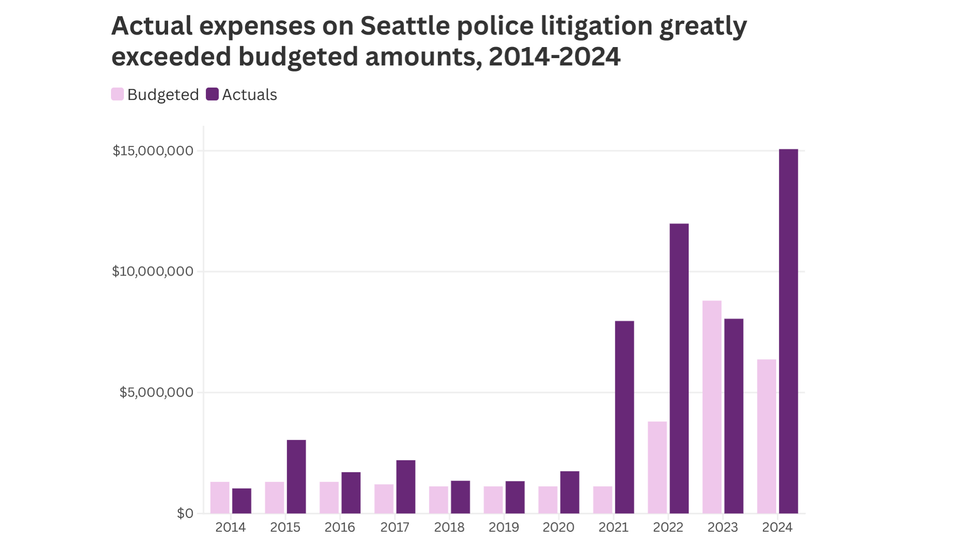Spending on Seattle Police Department settlements went over budget by 94% over the last decade

New data from the Seattle City Budget Office (CBO) shows the city spent nearly twice the amount of money it had budgeted for on settlements, judgements and litigation related to actions of the Seattle Police Department (SPD) between 2014 and 2024.
Over that eleven-year period, Seattle’s Finance and Administrative Services had projected expenses of $28.6 million for the “Police Action Expenses” subcategory of the pool of funds the city sets aside to pay for litigation and settlements. However, the CBO figures reveal that Seattle actually spent $55.5 million on Police Action Expenses. This data was sourced from publicly available budget documents on the city’s website as well direct correspondence with a representative of Seattle Mayor Bruce Harrell, who provided the 2024 actual spending numbers.
The massive growth in expenditures on SPD litigation coincided with the department’s violent response to the Black Lives Matter protests in 2020 in the wake of the police murder of George Floyd. While spending on Police Action Expenses exceeded the budgeted amount by 44.8% between 2014 and 2019, this dramatically increased to a whopping 111.3% between 2020 and 2024.
Although fiscal planners significantly increased their estimated expenses on the spending category after 2020, the CBO data suggests that Seattle has consistently under-projected the amount it would spend on SPD-related litigation. In fact, the city only remained under budget for two years over the last decade: 2014 and 2023. Moreover, the obscure line item — which is not categorized within the SPD budget — has not been subject to significant scrutiny, potentially minimizing the public’s understanding of the true scale of police spending.
Seattle’s spending on police litigation has continued to increase over the past few years, with 2024 proving to be the most expensive year with $15.1 million spent compared to $6.4 million budgeted. The spike in spending is likely driven by the $10 million settlement the city agreed to with 50 people harmed by SPD actions in January 2024. It appears that the city is prepared for more litigation expenses in the near future, with a total of $16.7 million budgeted for Police Action Expenses over the next two years.
Over the past year, Seattle has faced several lawsuits and claims by both victims of police violence as well as former SPD employees. In February, the family of Jaahnavi Kandula — the 23-year-old Indian college student who was killed in 2023 by former SPD officer Kevin Dave while he was driving at 74 miles per hour on an ordinary city street — filed a lawsuit against the city asking for $110 million in damages. Earlier this year, the Seattle Times reported that between 2023 and 2025, at least five separate lawsuits were filed by ex-SPD employees against the city related to allegations of retaliation and discrimination within the department. Meanwhile, multiple journalists and the Seattle Police Officers Guild have also recently sued the city, alleging that SPD was improperly delaying the release of public records.
Seattle’s Police Action Expenses spending spree comes as it faces a prolonged budget crisis due to reduced revenues from sales tax and other sources amid an economic downturn. This has resulted in the city cutting services, issuing a temporary hiring freeze in 2024, scaling back investments in affordable housing and depleting non-mandatory fiscal reserves. But, it should be noted that Seattle remains in a far stronger fiscal position than other comparable cities, with all three major credit rating agencies issuing Seattle AAA ratings with stable outlooks.
With other pressing crises related to homelessness, housing affordability and substance use disorders demanding attention and increased spending from the city, Seattleites may grow impatient with the high levels of spending on SPD litigation. But as of now, it does not seem like Seattle leaders have a plan in place to prevent police officers from committing actions that could invite more lawsuits and thus incur greater expenses for the city.

Member discussion